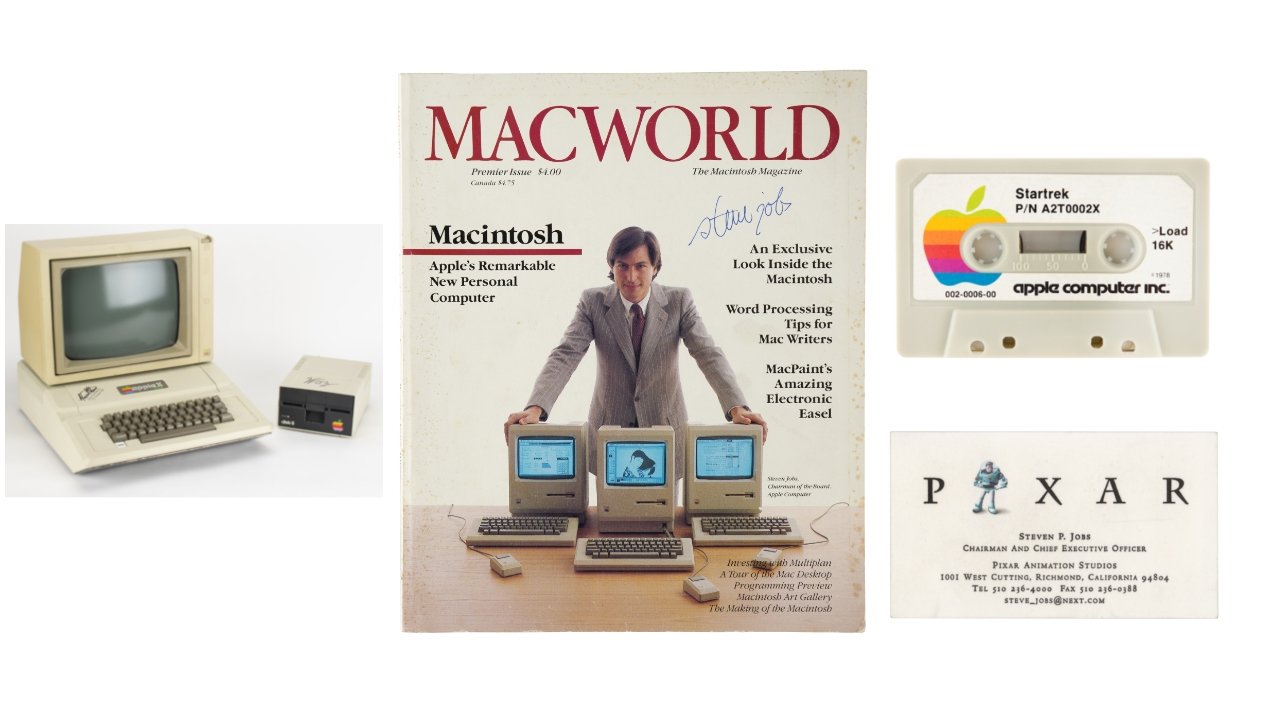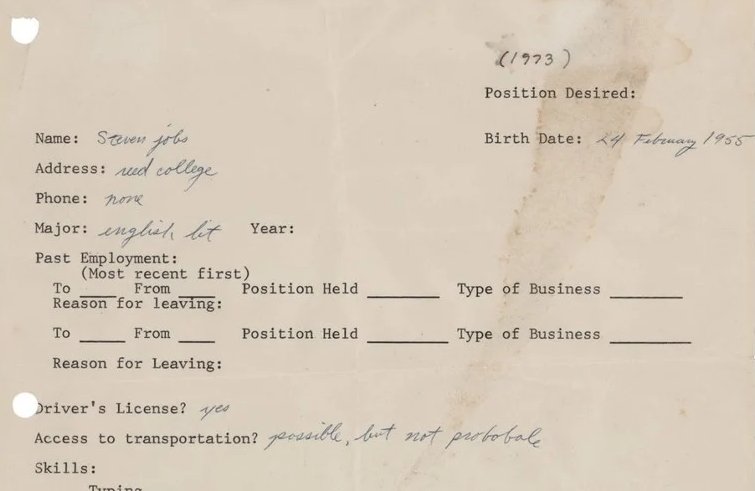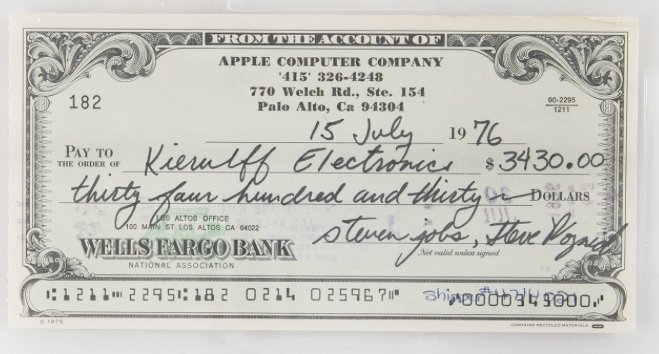Steve Jobs Atari application pulled from auction after authentication controversy
An auction of rare Apple memorabilia has concluded, but with its expected highlight of a Steve Jobs Atari application being withdrawn following doubts surrounding its provenance.

Items from the auction
RR Auctions of Boston, Mass., has concluded an auction of rare memorabilia that ranged from computers and autographs, to magazines and NFTs. It also included what had been authenticated as the application form Steve Jobs submitted to Atari, but reportedly that was removed from the auction.
It's suspected that the application may instead have been for a position Jobs got in 1973, when he applied to repair equipment in what was called the psych ward at Reed College.
"As such, we can no longer definitively state that this is his Atari job application," RR Auctions told iMore on Friday.

It's a real Steve Jobs application, but may not be for Atari. (Source: RR Auctions)
Among the remaining items, a 1976 check co-signed by both Steve Jobs and Steve Wozniak, sold for $163,923. The check was made out to Kierulff Electronics for parts for the Apple-I, with a face value of $3,430.00.

This check sold for almost ten times its face value, adjusted for inflation
In 2022 money, that's the equivalent of approximately $17,000. So the check sold for almost ten times its original value.
An original Twentieth Anniversary Macintosh, still sealed in its original box, went for $4,230.
The item that sold for the most in the auction was a mockup of a computer, but not one with any Apple connection. It was a prototype home Atari Pong game, and went for $270,910.
Read on AppleInsider

Items from the auction
RR Auctions of Boston, Mass., has concluded an auction of rare memorabilia that ranged from computers and autographs, to magazines and NFTs. It also included what had been authenticated as the application form Steve Jobs submitted to Atari, but reportedly that was removed from the auction.
It's suspected that the application may instead have been for a position Jobs got in 1973, when he applied to repair equipment in what was called the psych ward at Reed College.
"As such, we can no longer definitively state that this is his Atari job application," RR Auctions told iMore on Friday.

It's a real Steve Jobs application, but may not be for Atari. (Source: RR Auctions)
Among the remaining items, a 1976 check co-signed by both Steve Jobs and Steve Wozniak, sold for $163,923. The check was made out to Kierulff Electronics for parts for the Apple-I, with a face value of $3,430.00.

This check sold for almost ten times its face value, adjusted for inflation
In 2022 money, that's the equivalent of approximately $17,000. So the check sold for almost ten times its original value.
An original Twentieth Anniversary Macintosh, still sealed in its original box, went for $4,230.
The item that sold for the most in the auction was a mockup of a computer, but not one with any Apple connection. It was a prototype home Atari Pong game, and went for $270,910.
Read on AppleInsider

Comments
Wikipedia says that the Twentieth Anniversary Mac originally sold for $7499 (equivalent to $12,100 in 2020).
So that investment paid off. LOL
Yeah there a lot of those scenarios...
- Xerox sales department didn't trump (wasn't afraid of) what was coming out of their PARC labs.
- Or if Digital Research agreed to license CP/M to IBM for their new PC.
pragmatic
Now of days, it would really be weird because banks no longer send back canceled checks. I think it was some time in the late 80's, when US banks were no longer required to return canceled checks They could destroy canceled checks, so long as they kept a copy of it in their records and provide a copy to their customers upon request. With online banking, I can see all my transactions in my checking account and click on the check number to get an image (front and back) of my canceled checks.
The weird part is that Steve Jobs or Woz, should have been in procession of this check. At the time, Apple Computer was still operating out of a garage and didn't have an accounting dept.. They didn't even have an office. So my hunch is that Jobs still had it when he died and his widow donated the check to a charity, on the condition she remains anonymous, they auction it off and they get to keep all the proceeds. And for all we know, Apple Inc. (or its proxy) was the high bidder.
How can any one else legally own this canceled check, other than the signers or Apple, Inc.? I doubt if Steve Jobs would have given the check away (when he was alive) or that Apple Inc. would auction it off. And the auction house would not auction the check, if the entity putting it up for auction, could not prove they legally own it. Strange that we haven't heard about this check before this auction. Even 10 years ago, it probably was still worth hundreds of thousands of dollars, to whom ever had procession of it.
What would be very weird, is if we found out the the person picking up Jobs trash at his home or some Apple employee at work, found it in the trash bin and was how the check survived.
Even you might pay something for an old article you no longer have, but still brings back fond memories when you see one. It might be an old favorite toy you had when a kid, that's is now a valuable collectable. You might not pay the $100 going price for it on eBay but you might pay $3 for it, if you found it in a Goodwill toy bin. And you might still not want to list it on eBay, to get a $100 for it because of "sentimental value".
I collect old telephones. I have several wooden wall telephones with the crank you had to turn to get an operator and several hand held "candlestick" telephones with the separate ear and mouth piece. My favorites are old bakelite phones from the 40's and 50"s. Like the wall phone in "A Christmas Story", the one seen on "The Lucy Show", the one in "The Matrix", etc.. Plus more modern telephones like the "Princess" phone, the "Genie" phone and the futuristic "Ericofon" phone. They all have "monetary value", but for me, the only one that have any "sentimental value" is the "Lucy" phone from the 50's. It was the telephone I grew up using in the 60's. (I was born in the 50"s but didn't use the telephone until the 60's) But my "sentimental value" will not add any "monetary value" to the telephone when i sell it and didn't when i bought it. I just paid the going price. But for sure it was a telephone I had to have in my collection because of its "sentimental value".
But I digress, back on track. I don't think many of these people paying high prices for old articles are doing it because of "sentimental value". They are collectors/investors that wants to enjoy owning valuable collectables, while gambling that it will increase in "monetary value", over time. Old comic books and baseball cards, vintage Star Wars stuff, vintage Barbie Dolls, coins and stamps, Lego sets, etc. are enjoyable to collect and own, even if they might not increase in value over time. It's the same enjoyment that the wealthy gets from collecting Picasso's, wines, classic autos, antique furnitures, Samurai swords and of course, 40 year old canceled check with Jobs and Woz signature, along with "Apple Computer Company" printed on it. Investing in stocks on the other hand, is only enjoyable to own, if they go up in value.